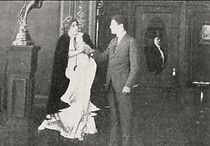|
In the garden of his seaside cottage, Don Emerson, novelist, writes contentedly on his latest book manuscript. Not far away sits his wife, Alice, devoted and true to him, yet possessing subconsciously the opposite temperament, the longing for the luxury and joy that accompanies wealth. With his mind fresh on his notes, there crosses the garden a stranger, Mary Allison. Don realizes the embodiment of his fiction character in the girl. Mary pleads to trespassing, attracted by Don’s roses. More and more attracted to her, he explains his startled glances toward her, and shows her the fragment of his manuscript containing the apt description of her. This leads to an exchange of names and addresses. Alice enters, excited over the sudden receipt of a letter telling of an inheritance of magnificent proportions just bequeathed to her by a relative. Somehow Don cannot wax enthusiastic over the announcement. Another day. The likes and dislikes of Don and Alice are quickly emphasized by her suddenly-acquired wealth. His first novel has been successful enough, but he finds himself losing his power of creation. Then comes an adroitly written little note from Mary. She is still waiting for the autographed copy of the novel promised her by Don. On this day, Alice’s entire house is given over to a bridge party. Don, on the spur of the moment, answers Mary’s note by calling upon her, the first time he has seen her since the day in the country. The marked contrast in Mary and her quiet, peaceful home, and in Alice, with her changed nature and her noisy, social-ruled house acts as a powerful magnet upon Don, who subordinates everything else to his desire for inspiration and successful writing. One day she finds herself in his arms. Alice’s extravagance and social activities continue. He leaves in a fury, telling Alice to remain with her happiness, while he seeks his. The days pass. Alice, repentant and sick, waits, broken-hearted for Don’s return. Finally in despair she calls in her lawyer. He tells her the only way she can win Don back is through the same agency by which she lost him, her money. He finds satisfaction in frequent trips to a charity children’s hospital which is run largely through large donations of his own. In this Mary also finds interest. Then comes Alice’s lawyer, with a check of $5,000. It is Mary’s for the asking, provided she will relinquish all claims upon Don and use her influence to persuade him to return to Alice. Mary’s reply is the check itself, returned to Alice, torn in half. Reluctantly Alice goes to Mary’s home. At the same hour Don, in Alice’s absence, visits her home to obtain valuable notes needed immediately. He enters the study to find everything unexchanged, except that the vase of roses close to his photo are fresh. Slowly he returns to Mary’s home, a germ of misgiving in his mind for the first time. About to enter the living room at Mary’s home he hears Alice offering Mary money if she will only step out of their lives. Mary remains impassive. Don enters Mary’s room and she realizes he has overheard all. He tells her that soon they would have discovered their happiness to be a phantom. She tries to detain him, but he returns to his own home. He finds Alice, racked by sobs, in his study, and there, where their differences were born, their final understanding is made complete. |
||
| Ratings: | IMDB: No rating yet | |
| Released: | September 2, 1915 | |
| Genres: | Drama Short | |
| Countries: | United States | |
| Companies: | Lubin Manufacturing Company | |
| Cast: | Ormi Hawley Earl Metcalfe Betty Brice | |
| Crew: | Shannon Fife George Terwilliger | |



michaelmyers : love this show [''!